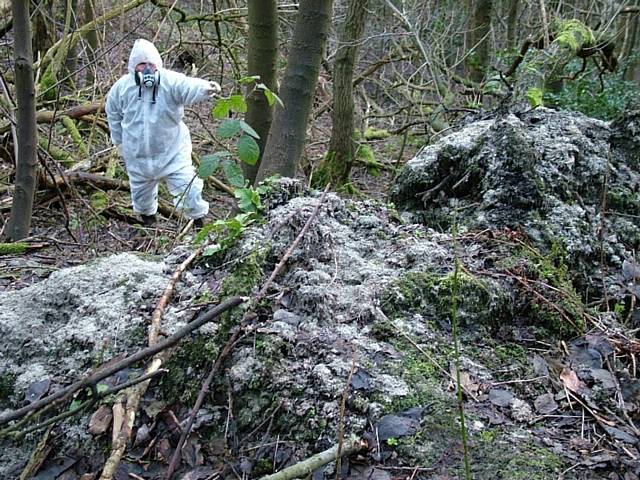Mesothelioma death rate 'higher than ever' 20 years after UK-wide asbestos ban
Date published: 04 July 2019

Exposed asbestos in the Spodden Valley in 2005
The number of people dying of mesothelioma is higher than ever, 20 years after the UK banned asbestos.
Since the UK ban in 1999, around 40,000 men and women have died of mesothelioma, a cancer linked to asbestos, which takes 20-60 years to develop following exposure.
The Health and Safety Executive (HSE) estimates a similar number will die over the next 20 years, as the UK has the worst incidence of mesothelioma deaths in the world, a legacy of our heavy use of the so-called ‘magic mineral’ in construction and industry after the war.
Although we no longer import or use asbestos, it is still a problem for us today and will be for some time to come, as more than 2,500 people die of mesothelioma in the UK each year, more than those who die in road traffic accidents.
130 people living in Greater Manchester were newly diagnosed with mesothelioma in 2018, a legacy of the area’s industrial past. One in 7 of these were former joiners, and one in 10 had previously worked for the asbestos giant Turner & Newall, which ran the world’s former largest asbestos factory in Rochdale’s Spodden Valley.
In 1924, the factory was the scene of the UK’s first recorded death due to asbestos exposure. Local textile worker, Nellie Kershaw, died at the age of 33 from pulmonary asbestosis, a chronic disease that inflames and scars lung tissue.
Read more about the history of the Turner Brothers Asbestos factory in Spodden Valley:
Many public buildings, such as schools and hospitals, workplaces and homes still have asbestos in the fabric of the building, posing risks of exposure to future generations unless safely removed.
On Friday 5 July at 12.30 pm, MPs, bereaved family members, mesothelioma victims and campaigners will assemble in Barbirolli Square next to the Bridgewater Hall in Manchester to remember all those men and women who have lost their lives to mesothelioma.
At the end of the rally, doves will be released as an act of remembrance.
Following the dove release, there will be a public meeting in the Friends Meeting House on Mount Street, near the Central Library, starting at 1.00pm. Lorraine Creech, from the national charity Mesothelioma UK, will speak on ‘Mesothelioma – the way forward’.
Graham Dring, of the Greater Manchester Asbestos Victims Support Group, said: “The UK asbestos ban in 1999 came nearly 40 years after the link between asbestos exposure and mesothelioma had been definitively established. If government had banned asbestos when the dangers were known, rather than prevaricate because of asbestos industry lobbying, the numbers of people dying would have been a fraction of the figures we have seen, and, unfortunately, are yet to see.
“We call on the government to make good on these failures by ensuring researchers are given sustainable funding in their search for a cure and better treatments for this dreadful disease.”
Do you have a story for us?
Let us know by emailing news@rochdaleonline.co.uk
All contact will be treated in confidence.
Most Viewed News Stories
- 1Drugs and cash seized during morning raids at suspected stash houses
- 2Middleton school hails another outstanding inspection result
- 3Ogden family announces intention to invest £2m in Rochdale AFC
- 4Former councillor and hospital campaigner Jean Ashworth has died
- 5Man convicted after police car filmed driving dangerously in Kirkholt
To contact the Rochdale Online news desk, email news@rochdaleonline.co.uk or visit our news submission page.
To get the latest news on your desktop or mobile, follow Rochdale Online on Twitter and Facebook.


